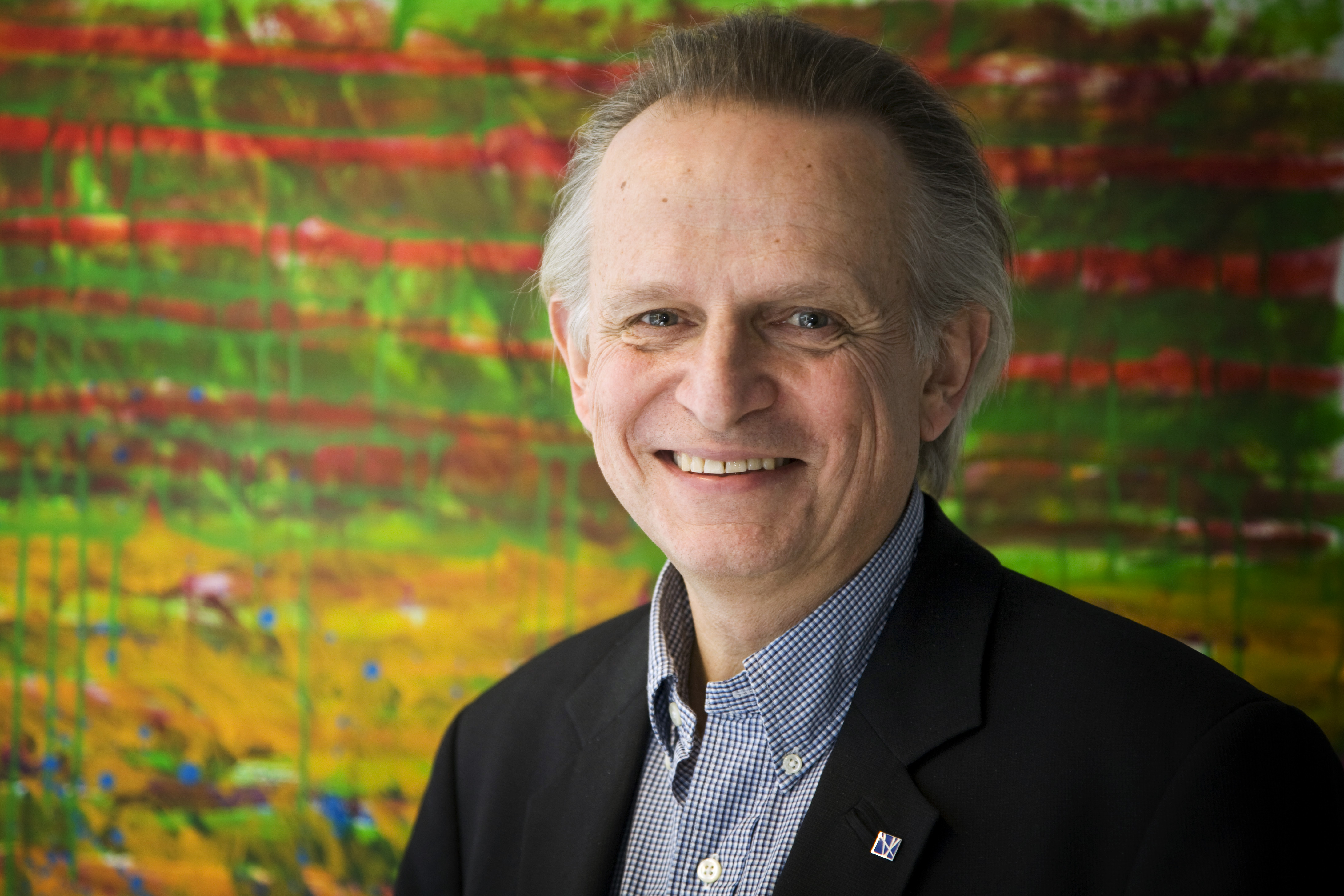Welcome!
I’m very happy to see you all;
family, friends, colleagues, collaboration partners
Because of my height, I’ve gotten used to
always bringing a box to stand on:
You won’t believe how much more I’m able to see
when I raise myself up a few centimetres.
I have chosen to give my speech in Danish.
Not to demonstrate anything to our
international colleagues……
or because I fear the Danish People’s Party
and all their works……
But because ‘language is power’, and having power over language
is important in some situations – like this situation:
Usually, I don’t have a problem speaking English –
but today – in this speech – I need
a linguistic precision, I’m only able to reach in Danish:
It IS interesting for me to stand here:
My point of departure is a long life as an employee
and the manager of local children’s clubs –
a degree in psychology from the University of Copenhagen –
and not least my father’s dream of me being
a dentist.
The only thing I was able to extract from that dream
was the importance of ‘opening my mouth’.
And that’s what I’m going to do
….also today.
As many of you know, I don’t insist on
being right –
I alone insist on having the right
to say – what I mean.
So what do I mean?
I will attempt to illustrate this through a number of
anecdotes….small points opening small windows
into an understanding of the great CBS:
The story about the naive debut on the Board of Directors
In 2003, Jens Frøslev, Doris Hansen
and I was elected as academic staff representatives
on CBS’ first Board
dominated by external members.
Without any luck, the Board had demanded that President FJJ (Finn Junge-Jensen)
prepared a ‘real’ strategy and at some point the ministry’s
first move to make a ‘performance contract’ was brought to the table.
The Board had a long and quite unproductive debate
about whether the contract was to govern the strategy
or whether the strategy was to govern the contract.
At some point, I naively asked for permission to speak:
Shortly worded, I suggested to the Board that we just
focused on the things we were already doing at CBS
and what we thought we were good at – and simply translated
them into formulations to be used in the
performance contract as well as the strategy…….
A minute of silence followed
while Jan Molin’s credibility died
to the chairman and several external members
The story about the uncontrollable driving force
In 2005, the then dean of
the Faculty of Economics and Business Administration were asked to
make a report to the Board about how things
were in terms of knowledge about and research in ‘innovation’ at
CBS.
Ole Stenvinkel informed the Board quite thoroughly
and completed the orientation by listing more than twenty different
departments, centres and projects he found
were working directly with innovation.
The external members of the Board were astounded.
What a meaningless organisation. How was management able
to defend this absurd, uncoordinated
waste of resources, where employees sat all over
campus, doing the same. The president had to
assert himself and ensure cohesion, large-scale operations
and governance.
The internal Board members agreed that
around ten more units at CBS
could be added to the dean’s list…..
The story about the courage to stand one’s ground
About ten years ago the then president Finn Junge-Jensen orchestrated
a grand collegiate development process,
in which CBS’ structure and organisation were to be discussed
with a view to possible change.
There were work groups, seminars, reports and
presentations with numerous positions, meanings
and possibilities.
The material was extensive and everyone was anxious to
see the result at the conclusive conference,
to which all the involved people
had been invited….
After a long day of debating and discussing possible
solutions, the president took the floor
to sum up the consequences of the long process and
the vast amount of information. Expectations were huge
and the surprise was even bigger when Finn mildly said:
‘CBS will maintain the current organisational structure –
but we are now able to do it on a well-informed basis!’
The story about the heroic decision
As a relatively new dean of education, I
had – for a limited period of time – an ambition
to ‘make a difference’ – to address an important matter.
At that time, CBS had for the first time signed
The UN Principles for Responsibility in Management
Education – what we call PRME today
I was extremely absorbed in CSR and found – together with great
colleagues – that CSR should be represented in the majority of our
study programmes.
In a severe case of optimism and arrogance, I made what they
in the TV show ”Yes, Minister”, would call a: ’bold decision’.
I decided that all bachelor programmes should integrate
a mandatory course in CSR in the first year. What happened….?
Well, 2-3 years later, less than a handful of programmes
had chosen to act up to the decision…..
and that was it.
I learned that you should never ‘pull rank’ and think
that that in itself is going to change any behaviour.
The story about management based on numbers and calculations
There was a new president at CBS
The fourth in my time
A true lumber jack
We went to Skjoldnæsholm; Per, Alan, Hakon and myself
for the first Senior Management seminar.
After having spent a long afternoon
explaining CBS’ matrix and all its bliss,
dinner was served. And –
to our great surprise – so was the opportunity
to smoke cigars in the park in front of the building.
(The President always has cigars in the trunk of his
SAAB)
So we spent time – by request of the President –
demonstrating how bad deans and director were
at estimating the height of a flagpole, a tree –
or what else presented itself
as being tall and measurable.
Little did we know just how significant, illustrative and exemplary
this innocent game turned out to be.
The story about the difference between measuring and leading
A few years ago, a seminar for the
heads of department was held in Kalundborg.
Peter Jonasson, the then university director,
introduced the audience to
new procedures for financial management at CBS….
CBS has numerous experts in this area
also among the heads of department.
The discussion shifted back and forth
until Kristian Kreiner (who at the time was
acting department head of IOA) unassumingly
asked Peter Jonasson whether all these financial initiatives;
quarterly statements and other resource-demanding
processes, in fact would make it easier to control CBS’ finances.
Kristian ascertained that it probably could be compared with
replacing a magnifying glass with a microscope, hoping to be able to
control more because you were able to see more…….
The university director frankly responded that it
probably wouldn’t make CBS more dirigible – but that it would
provide us with a more detailed knowledge of what
already HAD happened…….
The story about believing in your own excellence
Three years ago, the then
chairman of the Board started a tradition.
The Board would invite the incumbent minister
to visit the annual Board seminar in October
(in the past three years we have had the pleasure
of inviting three different ministers).
The first minister was Esben Lunde Larsen.
He came without his permanent secretary and offered his version of
CBS – just as he willingly listened to our
complaints of CBS’ lousy financing.
After he had left the meeting, the chairman
determined – after having thoroughly analysed what had
been said and heard – that there is cause for optimism!
The minister had been very responsive and understanding
of our problems.
After the chairman had attempted to praise
himself for a smooth effort –
our current chairman took the floor.
In a few objective sentences, he calmly reminded
the audience that politicians make their living by ‘selling hope’.
The story about my largest official chastisement
Innovation seems to be the Board’s favourite topic.
It has just been on the agenda of the annual
strategy seminar – and already was in 2014
where I had to give an account of how
CBS ‘innovates itself’.
In my opinion, it wasn’t exactly the task of
the dean of education (rather the president or the dean of research) –
but I went about the presentation of my account in a fresh
and confident manner.
I spoke of periphery development as a distinctive feature of
knowledge-intensive organisations – about emergence and leadership
expressed through coordination and resource allocation…..
The silence in the room was deafening – a somehow forced patience
Until I finally said
that during all my years focusing on management and organisational development
I had to admit that
good ideas never come from the management.
So I was in for a lengthy reprimand – in public
by a chairman who lectured me in
the immense impact management has on development.
The story about the positive feedback
I have taught management classes
for many, many years.
And not least participated in the CBS Summer University
offering a course in change management with
Jesper Strandgaard from IOA.
A large part of the course is about demonstrating
the connection between management and the
organisational context: You can never choose for yourself
in terms of management. Management is inextricably
bound to employee relations and a financial
and structural story.
Many years ago, we had a very bright participant in
our class (who, since then has had a great career
as the head of some of this country’s largest
cultural institutions…..)
During the final evaluation – after the participants
had politely praised Jesper and myself….he took the floor
and said: “this has been a brilliant course
in longer periods surprisingly close to not making any sense”
See, he knew what the point in fact is
It’s exactly what these anecdotes describe:
”a CBS – surprisingly close to not making any sense”:
To me, CBS is a mini-society, a living
organism under several types of
pressure towards conformity………
Many forces working like that come to us
as vermin sweeping over the heath…..
We have to try seeing that as reasons that
are convertible into intelligent answers.
However, a lot of forces come from the inside as
an imperceptible gesture, which is incredibly hard to spot.
As the title of an old IOA publication says,
we have to be concerned about and interested in
‘tacit control’.
In light of these anecdotes, allow me to attempt to describe
CBS’ significant character – hoping that other people
than me might have an interest in
protecting and further developing this special
university version we call CBS CBS is – described with a concept I have borrowed from
David Laberee: ’a perfect mess’ –
An absolutely genius mess of unmarketable answers to the
demands and expectations of an
adversary and inconsistent outside world.
The answers have been invented without any central intelligence and
without petty squinting at plans or principles.
This is exactly why we see CBS in an organisation, which
– subject to the conditions of the rationality of the outside world –
appears over-complex, cost-intensive and inefficient.
It makes too many people blind towards the fact
that exactly the growth of an incoherent and
almost pointless structure and organisation
makes it possible for CBS to attract the best of the best and
develop knowledge about and answers to problems
the world has yet to discover.
This is where inclusiveness lies – and thus
the protection of the playful and experimenting aspects
of research as well as education
The challenge is that it’s close to impossible to defend
CBS against the common sense criticism that it must be easier
and more governable having less complicated systems.
And the legitimisation of ‘the perfect mess’ is not just
a challenge in relation to external stakeholders
(national and international accreditation committees,
performance contracts, ministerial inspection,
National Auditors, etc., etc.)
Changing boards, presidents, university directors,
deans, members of the academic council,
heads of department and programme directors
students for that matter………..
have recurrently asked similar questions
about the complexity of CBS.
CBS’ organisation and idea of governance are in no way
invented to solve the problems we face today.
But it is exactly this special, coincidental
formatting, which makes it possible to solve problems
in the time they arise.
It’s a formatting with many names and many
interesting characteristics:
James March called CBS an organised anarchy
as a declaration of love for the limited
rationality and the surprising decision-making processes.
Karl Weick gave us knowledge about loosely coupled
systems and the need to make sense where no
sense or meaning is given in advance.
He opened the doors to the understanding of oxymorons….. The juxtaposition
of seemingly incompatible phenomena such as:
CBS Senior Management, business university and financial management
Otto Scharmer made it possible to understand how CBS
comprehends the world and ourselves through the concepts we use:
”mindset, forum, partner, transparency, platform, blended…”
All of them semantically empty categories, which, by virtue of their
indefinable character, make it possible for us to talk about our
complexity and diversity in a way that
renders an illusion that we are talking about the same phenomena.
Edgar Schein and the culture wave made us focus on distinction
and common characteristics – at CBS as the feedbackless vacuum – and
Ralph Stacey introduced us to the discussion
of chaos and complexity and all of a sudden it became
more clear where CBS is imploding – where
the black holes are, which suck up all the energy……
leadership pipeline, value-added output, BFI accounts
job satisfaction surveys, MUS, supply contracts,
strategy projects, long-term budgeting and many others
As such, CBS vitalises a quite
astounding and predictable stability of ungovernableness.
The governance paradigm is quite simply out of step with
the system it is presumed to govern:
Two logics out of sync;
on the one hand the decentralised, playful and courageous
effort and professional identity…….
And on the other the central, cold, controlling reason and
professional rationality…… The balances will shift back and forth…….
For instance, we have been centralising for years – allegedly to
ensure alignment, stability and quality
in what we deliver.
We have also experienced that centralising just for the sake of centralising
creates problems and prolongs processes.
We know that all organisational solutions
are solely a question of which problems you
choose to be your ally.
New solutions always cause new problems…….
Maybe it’s time to decentralise again.
Maybe we have learned so much and implemented so many
standards and systems that the execution will be better
and more smooth, closer to the user.
Standards, rules and procedures are the
necessary precondition to make exemptions – and
requires that the user is put
before the system.
Taught by Thomas Werner, rules cannot be restrictive
to discretion where good management practice exists.
I’m partly responsible for a lot of alignment and
must point out that now is the time to
rethink ten years of dominant management logic.
My collaboration over time with
3 chairmen of the Board
4 presidents
4 university directors
3 research deans
stops now.
New management groups will have to consider
which management logic and direction CBS has
to adapt to in future……..
We know, that we at CBS have reached our
capacity limit. Obviously it is a problem, but
the great challenge is adaptability:
In the battle for political support, ministerial
acknowledgement, accreditations and rankings
CBS is at risk of losing distinction, identity and pride.
The development of the past years is threatening to move CBS
from being a system with focus on ambition and outcome
to a system, which, in essence, has been reduced
to an input-output model.
The battle for resources is fought on the basis of target figures,
income statements and performance as such.
But distinction, identity and pride are associated with
expertise and content – what you might call
substance.
When an institution places a stronger focus on performance
than on substance – it leads to conformance……..
Conformity leads to disappointment and disappointment turns
into projection. It is much too easy to agree that
management, ministry and politicians are to blame.
It is more difficult to see the need to mobilise a
defence for CBS’ fundamental qualities and distinctions.
Behind the increasing trivialisation of the university CBS
the feeling of loss is growing – a loss that creates
anger and sorrow.
In conclusion, you might say that CBS’ fundamental
challenge has been and still is to explain
that we are a success –
that we have been successful in developing a local distinction
which other universities should attempt to imitate…..
in a situation where the majority of our most significant
stakeholders are seeking to make CBS look like the others.
Let me repeat this recurrent concern of mine:
How can we avoid that CBS ends up like a mediocre
imitation of a North American Business School?
That is a joint responsibility and not just up to a new management.
Reportedly, we are in good hands – we all have to help
ensure that the hands are warm, too.
CBS has the best programme administration in Denmark.
Wilbert, the head of the programme administration and all the vice deans
make – together with the Dean’s Office – one razor-sharp, professional
and service-minded unit, who, together with the programme administration, handles 23,000 students in more than 50 programmes
with more than 125,000 annual exams impressively. – Without their extremely competent effort, I wouldn’t have lasted one season.
The education area is thus in a very good condition
I have always slept well at night –
and will also do it in the future.
Some times during the meetings in the Dean’s Office,
the dean tends to draw a bit of attention to himself,
drunk with his own outstanding qualities.
When the meeting ends and we leave the room, I
can hear them tell each other:
”What Jan means is probably……..” – and then I’m convinced that they will find a way of interpretation that ensures that the education area also will be in a sound condition in the future.
Imagine everyone doing what I told them to.
It would lead to a pure disaster in no time.
In January, I will move up to new and old
colleagues at IOA. I’m going to sit there like a weakly
and somewhat timid version of Ogier the Dane – READY
when I’m called upon….and happy that Signe has found room
for me on the 4th floor, so this Ogier isn’t going to be
put away in the basement.
If you need someone to join the debate, then go and ‘find Waldo’!
I’m at your service.


































































































































Comments